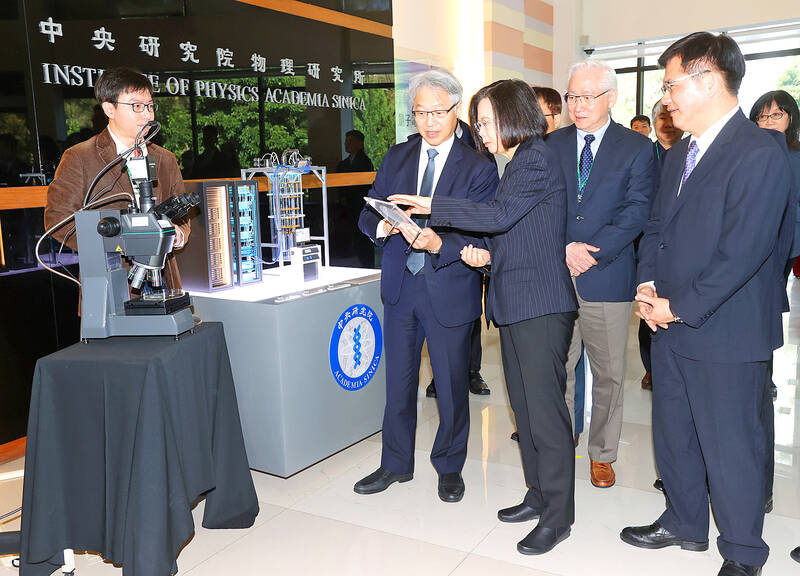A superconducting quantum computer developed and made in Taiwan represents a significant stride in Taiwan’s quantum technology, President Tsai Ing-wen (蔡英文) said yesterday.
Tsai was speaking at a forum organized by Academia Sinica on the progress in research made by its Thematic Center for Quantum Computer.
Lauding the breakthrough as a testament to Taiwan’s prowess in the field, Tsai said the plan was initiated by Academia Sinica more than three years ago.

Photo: CNA
That led to National Tsing Hua University’s development of quantum network coding in May last year, which is expected to boost Taiwan’s capabilities in cybersecurity, national security, finance and biomedicine.
The new computer was developed through a quantum technology project funded by the National Science and Technology Council, Academia Sinica said.
The project came to fruition in October last year when Academia Sinica successfully developed a computer based on 5-quantum-bit (qubit) chips in collaboration with multiple domestic and foreign institutions.
On Jan. 19, the new quantum computer began providing online services to program participants and it is used by developers as a platform for developing complementary metal oxide semiconductor and parametric amplifier technologies, the institution said.
Taiwan is one of the few countries capable of independently producing a superconducting quantum computer, Thematic Center executive officer Chen Chii-dong (陳啟東) said earlier this month.
The research institute initially proposed the idea of developing a superconducting quantum computer in Taiwan in 2019 and has since received government support, Academia Sinica president James Liao (廖俊智) said yesterday.
Tsai pledged to inject additional funding into Academia Sinica’s south branch to support its continued development of quantum computing technologies and efforts to establish a quantum technology industry chain.

‘DENIAL DEFENSE’: The US would increase its military presence with uncrewed ships, and submarines, while boosting defense in the Indo-Pacific, a Pete Hegseth memo said The US is reorienting its military strategy to focus primarily on deterring a potential Chinese invasion of Taiwan, a memo signed by US Secretary of Defense Pete Hegseth showed. The memo also called on Taiwan to increase its defense spending. The document, known as the “Interim National Defense Strategic Guidance,” was distributed this month and detailed the national defense plans of US President Donald Trump’s administration, an article in the Washington Post said on Saturday. It outlines how the US can prepare for a potential war with China and defend itself from threats in the “near abroad,” including Greenland and the Panama

A wild live dugong was found in Taiwan for the first time in 88 years, after it was accidentally caught by a fisher’s net on Tuesday in Yilan County’s Fenniaolin (粉鳥林). This is the first sighting of the species in Taiwan since 1937, having already been considered “extinct” in the country and considered as “vulnerable” by the International Union for Conservation of Nature. A fisher surnamed Chen (陳) went to Fenniaolin to collect the fish in his netting, but instead caught a 3m long, 500kg dugong. The fisher released the animal back into the wild, not realizing it was an endangered species at

The High Prosecutors’ Office yesterday withdrew an appeal against the acquittal of a former bank manager 22 years after his death, marking Taiwan’s first instance of prosecutors rendering posthumous justice to a wrongfully convicted defendant. Chu Ching-en (諸慶恩) — formerly a manager at the Taipei branch of BNP Paribas — was in 1999 accused by Weng Mao-chung (翁茂鍾), then-president of Chia Her Industrial Co, of forging a request for a fixed deposit of US$10 million by I-Hwa Industrial Co, a subsidiary of Chia Her, which was used as collateral. Chu was ruled not guilty in the first trial, but was found guilty

DEADLOCK: As the commission is unable to forum a quorum to review license renewal applications, the channel operators are not at fault and can air past their license date The National Communications Commission (NCC) yesterday said that the Public Television Service (PTS) and 36 other television and radio broadcasters could continue airing, despite the commission’s inability to meet a quorum to review their license renewal applications. The licenses of PTS and the other channels are set to expire between this month and June. The National Communications Commission Organization Act (國家通訊傳播委員會組織法) stipulates that the commission must meet the mandated quorum of four to hold a valid meeting. The seven-member commission currently has only three commissioners. “We have informed the channel operators of the progress we have made in reviewing their license renewal applications, and